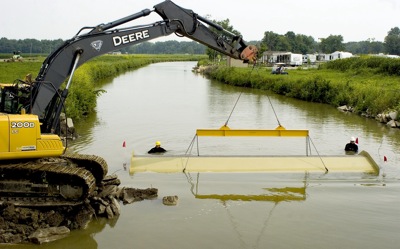Thursday, June 24th, 2010
Costs rising for public defenders
More indigent defendants, less funding leaves counties footing the bill
By Shelley Grieshop
Ohio remains financially strapped and counties are being forced to pay more to fund attorneys for an increasing number of people who can't afford one.
The U.S. and Ohio Constitutions guarantee every citizen the right to an attorney to ensure the quality of justice a person receives is not determined by their financial status. Counties, by law, must oblige. To help them meet the financial obligation, the state offers financial assistance.
Prior to 2008, the state reimbursed up to 50 percent of each county's public defender fees. The amount now is 35 percent and counties often receive much less, officials say.
"Even though the state was reimbursing at the rate of 35 percent for 2009, Mercer County was reimbursed for less than 24 percent, as some costs were not allowed by the state," said Kim Everman, clerk administrator for the county commissioners.
Last year, the state paid $42,729 of Mercer County's total cost of $179,884 (23.7 percent). In neighboring counties, the reimbursement rates were much higher - 32 percent in Auglaize, Darke and Shelby counties and 33 percent in Van Wert and Allen.
Mercer County gets less because it pays its public defenders $5-$10 per hour more than the rate set by the state, Everman said. Although taxpayers pick up the amount not reimbursed, the method helps keep a healthy number of public defenders to choose from, commissioners said.
Commissioner Jerry Laffin said he believes it would cost the county more to set up a public defender office like neighboring Auglaize County.
Public defender costs statewide jumped from $70 million to $112.9 million from 2000 to 2008. Recent increases were, at least in part, a reflection of the poor economy, state officials said.
"The present funding system for indigent defense in Ohio is strained beyond the breaking point," stated a recent report from the Office of the Ohio Public Defender.
Indigent caseloads in Ohio are up about 35 percent since 2000. Some counties, including Van Wert, where unemployment rose to more than 15 percent in January, have reported more than a 100-percent increase in cases, the report said.
Commissioners choose the type of public defender system in their county. The four types include an assigned counsel system, which allows judges to appoint attorneys from a list; the creation of a public defender office; outside contracts for the service; or the use of attorneys provided by the state public defender's office.
Mercer County handled more than 400 indigent cases last year. For decades it has used the assigned counsel system, according to Mike Huber, chief probation officer and bailiff for common pleas court.
"Fortunately, we've historically had good cooperation with our local attorneys," he added.
There are 15 attorneys in the area who - besides their private practice - defend criminal suspects who don't have money to hire legal representation. The attorneys' assignments often depend on their workload and experience with certain cases, Huber said.
Celina attorney Jim Tesno has worked as a public defender for about 30 years, he said. He believes Mercer County's system is a "bargain" for the taxpayers.
"We're (public defenders) not making much money on this. It really isn't a profit-making business. I consider it my community service," he said.
County commissioners meet periodically with judges and members of the county's bar association to set the attorney fees for specific cases/services. A murder case, for example, typically fetches a maximum of $6,500.
Allen County uses the same system as Mercer County. Van Wert and Darke counties contract with a consortium of attorneys; Shelby and Auglaize counties finance a public defender office, which includes the financing of wages, rental space and equipment.
Auglaize County employs two attorneys as public defenders, as well as a full-time and part-time secretary. Joe Lenhart, the county administrator, said the system guarantees there are attorneys to summon for indigent cases.
"We thought a few years ago about assigning cases to various attorneys but we had big concerns. We thought a lot of our attorneys wouldn't take the cases and we'd have to seek help from Lima or Sidney. Then we'd also have travel expenses," he said.
Lenhart said he also feared the attorneys they'd get might not be as qualified.
"We'd probably get the young ones just cutting their teeth," he said.
Operating its own office costs Auglaize County taxpayers more than $250,000 each year to process more than 900 cases.

